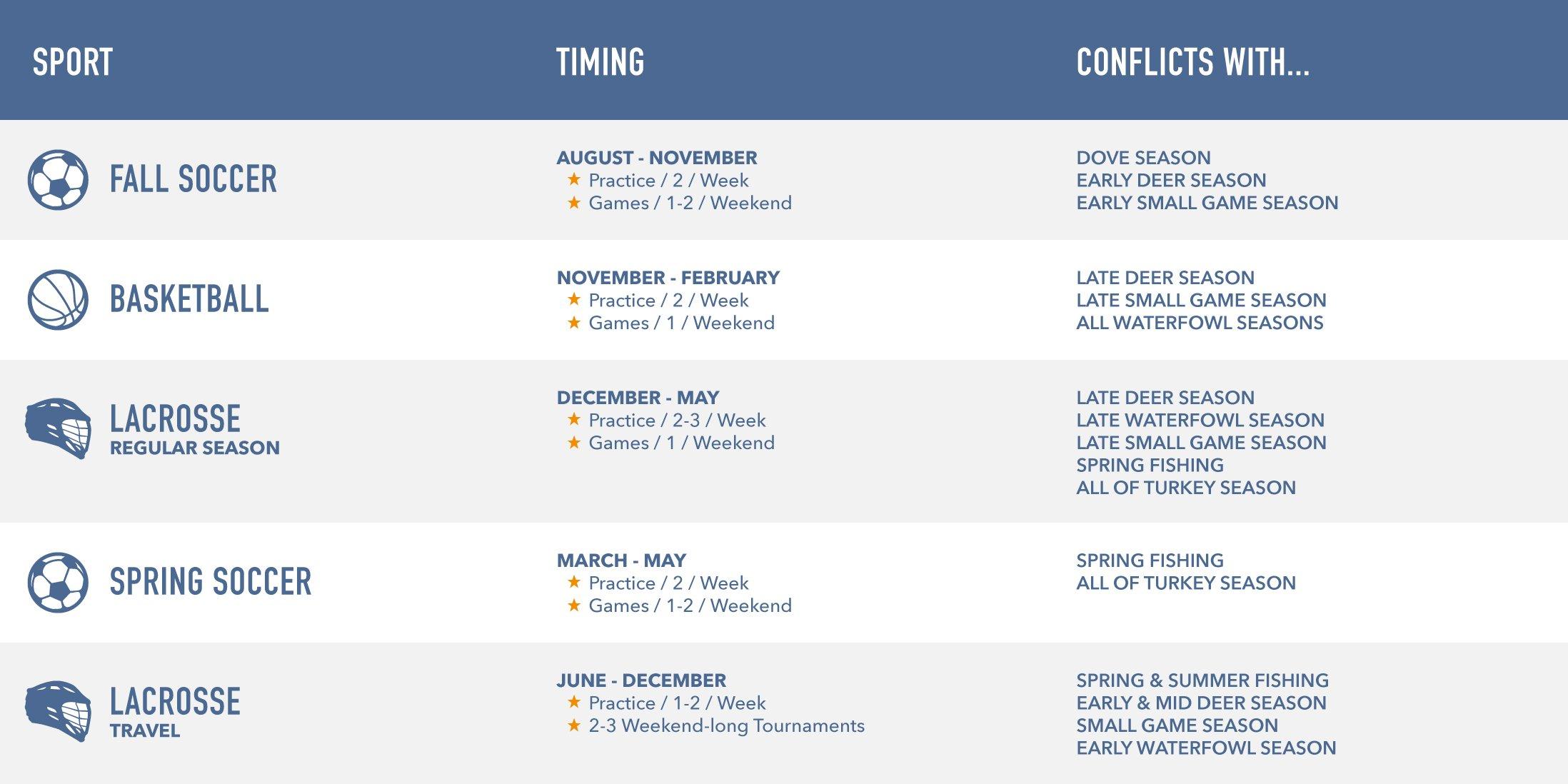Many parents say their kids can't go to the woods because team sports just take up too much time
The 2018-19 deer season was going to be a great one. My husband, Brett, and I joined a deer lease a couple hours from our house with plans to take our kids out every chance we'd get. We'd spend the weekends and holidays pursuing whitetails, hanging out by the campfire in the evenings and just making great memories with our family outdoors.
After much anticipation, the first weekend of the season rolled around, but both boys had weekend-long lacrosse tournaments out of state. That's OK, we said to one another. We'll go next weekend. But the next weekend was rained out. More lacrosse games put a stop to our hunting plans the following weekend, and then basketball season started and games and practices crowded our calendar. Guess how many times we took the kids to the lease to hunt that season? None. Zip. Nada. Between the constant games and a deer-season weather forecast that included storms almost every weekend, we could never make it work.
Well, that was a colossal waste of money, Brett said more than once as deer season wound to an end. He'd managed to make it to the lease by himself a time or two, while I stayed behind for the kids' activities, but the point was to have a place for the kids to hunt. Needless to say, we didn't join the lease again this year.
Yes, we all know that lack of access, urbanization and competing interest from electronics are causing a decline in new hunters. But there's another truth that's not talked about as often: Many kids aren't hunting anymore because they're too busy playing sports.
I have four kids ranging in age from 10 to 16. Each one of them plays team sports. To keep ourselves sane and in an attempt to ensure at least a little bit of time to enjoy outdoor activities, we limit the kids to one sport each during any given season. Problem is, many of those seasons overlap and with four kids, that's a lot of time at the lacrosse field, soccer field and basketball court and little time for much else. I spend hours on the road shuttling kids to and from their practices every night of the school week, and most weekends are taken up by games.
Through talking with other team parents, I've learned I'm not alone in my frustration. Fellow lacrosse dad Clark Vines, who is also on our local lacrosse board of trustees, says for his family, sports are a huge obstacle to hunting.
Vines, an avid hunter, has two boys. His oldest plays lacrosse and football and his youngest plays lacrosse, football and he wrestles.
The problem is that each sport is now almost a year-round commitment.
The problem is that each sport is now almost a year-round commitment, Vines says. Used to, there'd be a baseball season, a basketball season and a football season, but that's not the case anymore. Now, practice for each sport lasts much of the year. We have practice or a game almost every school night and during the weekend, making it almost impossible to take the kids hunting. My oldest son loves duck hunting and has decided to quit his high school wrestling team so he can duck hunt. His wrestling team literally had practice every day of the school week and games on the weekends. They also held practice every day during the holidays except Thanksgiving and Christmas day. There was just no way he could duck hunt and also be on the wrestling team, which is a shame.
As Vines points out, youth sports today require a much larger time commitment from kids and parents than they did generations ago. Even when I was a child, a team sport consisted of maybe one or two practices plus one game a week during a season that lasted a couple months. These days, parents are often led to believe that in order for their child to be competitive in a specific sport, he or she not only needs to play during the season, but also take private lessons, play on a travel or club team and attend training camps throughout the off season. Some sports have even extended or added seasons.
A 2017 article in Time ("How Kids' Sports Became a $15 Billion Industry") explains the economic push of youth sports and how kids of all skill levels, in virtually every team sport, are getting swept up by a youth-sports economy that increasingly resembles the pros at increasingly early ages. The article says while Little League participation is down 20% from its turn-of-the-century peak, private club teams have taken their place and many of them require massive amounts of money and investment of time. Both mine and Vines' boys participate in club lacrosse, as there is no sanctioned school lacrosse team. My girls also participate in club soccer, which has become huge in the area where we live.
As mentioned above, in addition to increased time commitment, costs for team sports have skyrocketed in recent years. A Money.com article says parents spend on average approximately $700 per child per year for participation in one team sport, but costs can easily soar into the thousands per sport each year. As you know, money for hunting gear, licenses and land access can all mount up as well. For many families, it's too expensive to fund both youth sports and hunting.
Phillip Hunter, assistant lacrosse coach and local lacrosse club board member, says at times it's hard to justify the costs of his duck and deer leases because his son's lacrosse schedule prevents them from hunting on those leases as much as they'd like.
When my children were young, I'd hunt almost every weekend, Hunter said. Now I don't feel like we're getting to use the hunting leases as much as we should. I can't help but wonder if the cost of being in camp is justified.
Now I don't feel like we're getting to use the hunting leases as much as we should. I can't help but wonder if the cost of being in camp is justified.
An article titled Organized Sports are Not Play, published by the Alliance for Self-Directed Education, explains that until a few generations ago, most middle-class children in the U.S. didn't participate in organized sports outside of the school day until they were in their early teens, and then usually it was on school-sponsored teams. Interest in adult-run club sports increased around the time that salaries for professional teams began to skyrocket. Parents and coaches promoted the idea that talented kids had a shot at professional sports if they started early and worked hard. But, that shot is minute, as fewer than 1% of high school athletes actually reach the pros.
Now, organized sports have become normal for children as young as 4 years old. Stop by our local soccer fields on any given Sunday and you'll see children not much older than toddlers in oversize jerseys and shin guards chasing soccer balls up and down the field. By the time a child is old enough to really start hunting, he or she is often already invested in team sports.
When you consider that approximately 45 million kids play team sports, and the fact that each sport requires much more time and investment on average than it once did, it becomes apparent that organized team sports are at least one factor in the decrease of hunting participation among youth.
Even though we know the stats, I'd be lying if I said we don't feel the pressure for additional time on the field, especially because it seems like most other team members are putting in that extra time and our kids fear falling behind. Vines says he also feels that pressure. Things need to change as a whole, but I'm not sure that's going to happen. Team sports have become too serious. Kids need to be able to participate in a sport without feeling the need to practice year-round, and they need time to pursue other passions. The irony is, I know what the problem is, and I want it to change, but I'm also part of the problem as my kids are doing all the things I'm complaining about.
Like Vines, we want our kids to participate in sports and perform at their best, but we also want them to have the opportunity to develop a love for the outdoors. So how do we solve this problem? I don't think there is a one-size-fits-all solution. Each family has to find the balance that works best for them. Of course, the more kids you have, the more difficult that balance is to attain.
I believe the best hope for parents who want their children to both play team sports and develop a love for hunting and fishing is to be intentional when it comes to planning kids' activities. Decide during their younger years how much time you want to spend with your kids outdoors and try not get sucked in by the pressure and hype from coaches and overly enthusiastic team parents.
Hunter says it's also important to plan ahead year by year. I've learned from experience that I have to block off days on our calendar ahead of time to make sure my son and I get to hunt together," he says. "We love to dove hunt, so each year we block off opening weekend and decide, no matter what, that we're going to hunt that weekend. Hunter says he also reserves days on his calendar for deer and duck hunting.
In addition to planning ahead, Hunter recommends that parents get involved in planning the direction of their kids' team sports. Join the board or become a parent advisor for your child's sports team," he says. "One of the reasons I joined the lacrosse board was so I could push to keep weekends practice-free so we'd have more time to hunt and participate in other activities.
You may think that taking on an advisory role with your child's team will only take up more time, but in the end, it may actually result in additional time available for the outdoors.
Get involved from a community standpoint, Hunter said. You've got to stand up for your family time.










